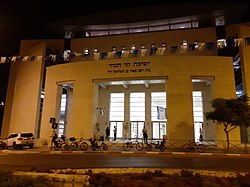

Yeshivat Har Hamor (Hebrew: ישיבת הר המור); is a Religious Zionist yeshiva in Har Homa, Jerusalem, founded in 1997 as an offshoot of Yeshivat Mercaz HaRav. The president of the yeshiva is Rabbi Zvi Thau, and the Rosh yeshiva - head of the yeshiva - is Rabbi Amiel Sternberg. There are around 850 students. Many of the students are married ("avrechim"), and the average student age is higher than at most Religious Zionist yeshivas.
The name means "mountain of myrrh", based on Song of Songs 4:6, a phrase which in the Jewish tradition refers to the Temple Mount. The word "Hamor" is also an acronym for "Hemshech Mercaz HaRav".
History
The Yeshiva was founded when a group of rabbis, led by Zvi Thau, broke off from Mercaz Harav. The broader cause of the separation was a disagreement between Thau and Rabbi Avraham Shapira, head of Mercaz HaRav, about methods of Torah education. The immediate cause was Rabbi Thau's opposition to the establishment of a teacher's college in the yeshiva. This was the first time a Religious Zionist Yeshiva had split.
Since the founding of the yeshiva, the twin brothers Rabbi Mordechai Sternberg and Rabbi Amiel Sternberg simultaneously held the position of Rosh yeshiva - heads of the yeshiva, until the passing of Rabbi Mordechai Sternberg in late 2022.
The yeshiva has been located at sites in several neighbourhoods in Jerusalem - Kiryat Menachem, then Bayit VeGan, and then, in 2008, to Kiryat HaYovel. The yeshiva moved to a newly built permanent building in the Har Homa neighbourhood in August 2017.
Ideology

The yeshiva follows the teachings of Rabbi Abraham Isaac Kook and his son Rabbi Tzvi Yehuda Kook. It has a mamlachti ("statist") approach which sees special holiness in the institution of the State of Israel, which Rabbi Kook (the elder) termed "God's throne in the world". The yeshiva stands at the head of a number of institutions also connected to Thau, which together are known as "Yeshivot hakav" ("yeshivas that follow the line").
In addition to the study of Talmud with the traditional commentators (Rishonim and Achronim), the yeshiva emphasizes the study of Jewish thought (Machshava) according to the approach of Rabbi Kook.
Students usually serve in the Israeli army in a framework called "Hesder Mercaz", as in Yeshivat Mercaz HaRav.
References
- שיימן, צבי (22 August 2017). "אלפים בחנוכת בית המדרש החדש של הר המור -". www.srugim.co.il (in Hebrew). Retrieved 23 August 2017.
External links
31°45′51″N 35°10′14″E / 31.76417°N 35.17056°E / 31.76417; 35.17056
Categories: